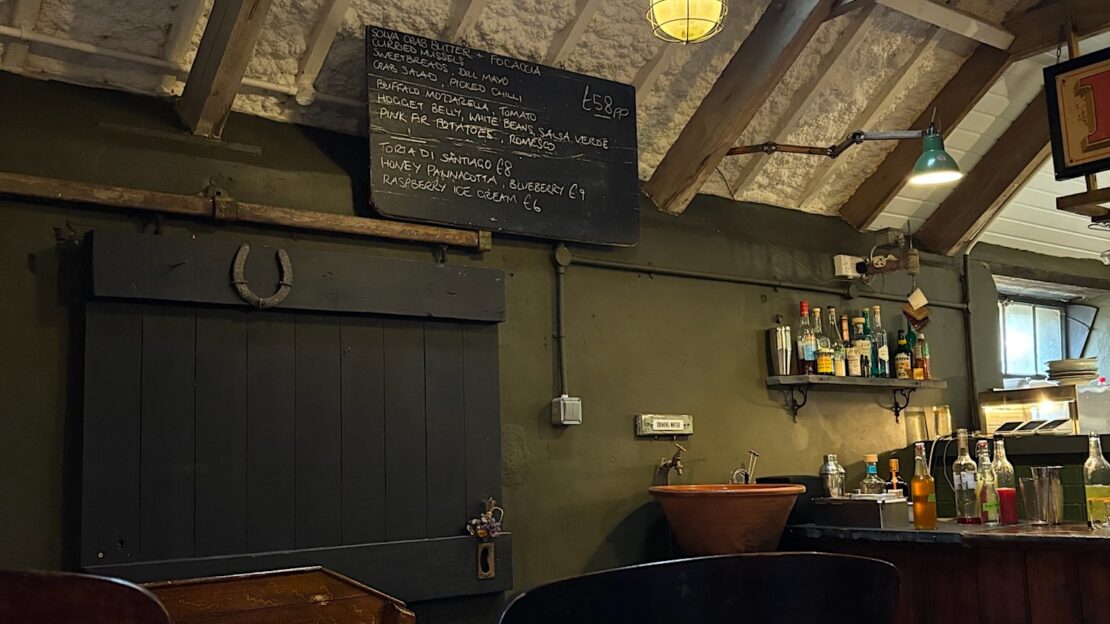by Jacob Butler
“From the moment you pull into the farm it is impossible not to feel closer to what you’re about to eat.”
‘Farm to table’, ‘field to fork’, whichever you prefer, demands our close attention. As a concept, it is no recent phenomenon: the idea of ‘knowing where your food comes from’ existed long before the days of globalisation – before things got complicated. As well as a social movement, it is an EU strategy. And today, a blueprint for restaurateurs to follow.
In restaurant terms, ‘farm to table’ is credited to Alice Waters and the iconic Chez Panisse in California, a place that calls on humble farming principles and cooking in more basic forms. There is no mass production. No excess packaging. No industrial-scale consumption.
Instead, it draws on an unspoiled reality – like a toddler’s drawing with scribbled tractors, green grass, blue skies and wonky farm animals. You eat what you grow and rear. By design, the journey from the field to your plate is short and uncomplicated. The flavours do the work for you.
That image is dreamlike, and partly why the ‘farm to table’ concept has been criticised as rooted in idealism at a time when the reality is stark. We’re swayed by cost rather than quality. We lose sight of where food comes from – and turn a blind eye to where the waste goes. It’s a broken system, for sure. But if we have any hope of fixing it, the solution can only be radical, not least ambitious.
It is a global issue that demands a universal response. But, at a ground level, there are restaurants pulling their weight, doing their bit to promote and protect the cause. These places provide a different kind of dining experience that goes beyond a concept restaurant. You’d need only go a few miles outside Abergavenny to find Three Pools where those founding principles are on show.
Paternoster Farm
Today’s focus, however, is further west, in Pembrokeshire at Paternoster Farm. It’s easy to get carried away with such places. Like its name suggests, this is farmyard dining – make no mistake. If you spot the missable signage, you’ll wind down what looks like a road to nowhere before stepping out onto a yard and then into the restaurant.
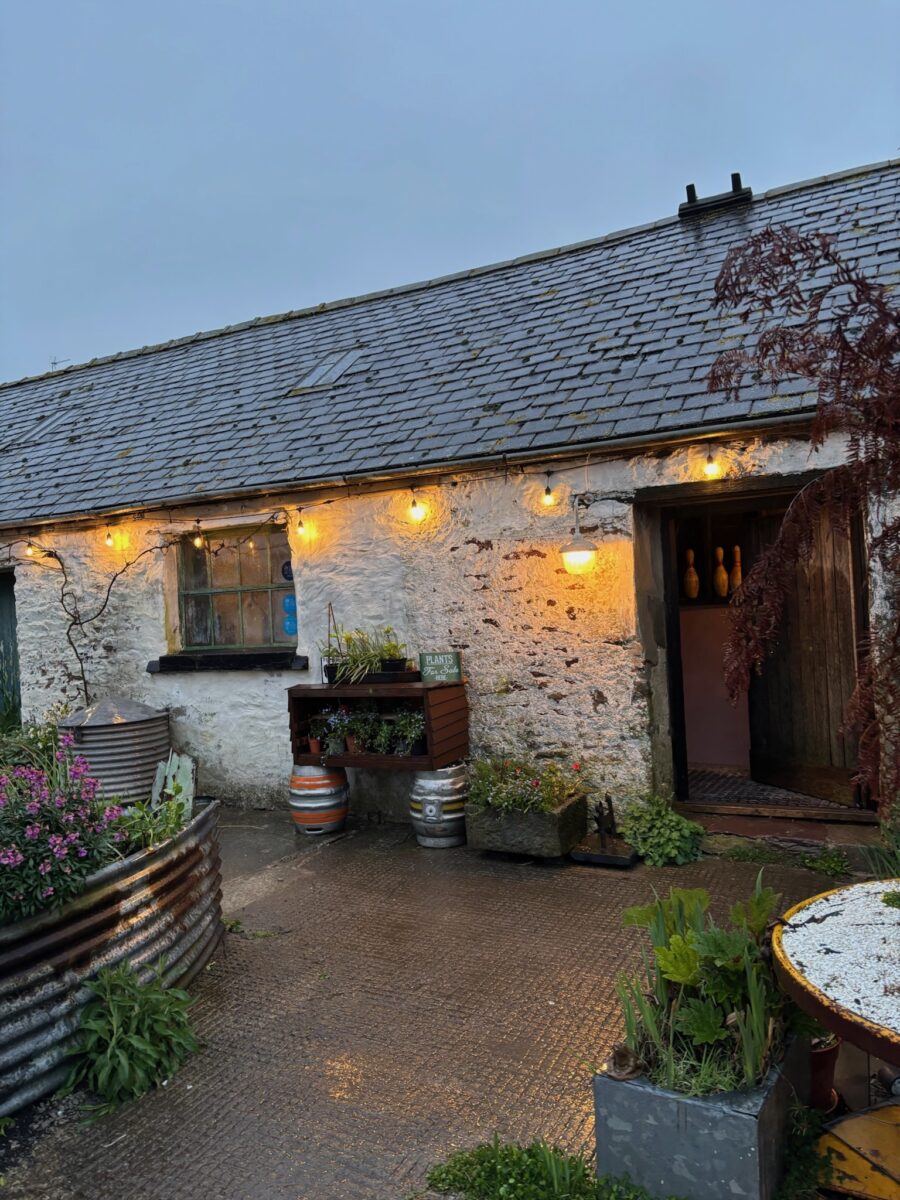
As an old cow shed, cubicle partitions stand between you and the next table. Chairs hang from exposed beams, quirky paintings line the walls. At the far end an open kitchen glows in a room where lighting is scarce. There are shelves of natural wine, and pampas grass strung up to the ceiling.
It’s an aesthetic that so many places try to crack but so easily over-egg. Here it feels for a second or two like you’re in one of those haunts – but you’re soon reminded that this is a shed on a farm in deep West Wales. You let the imperfections lie. You admire the unspoiled ruggedness, embrace it for all that it is and is not.
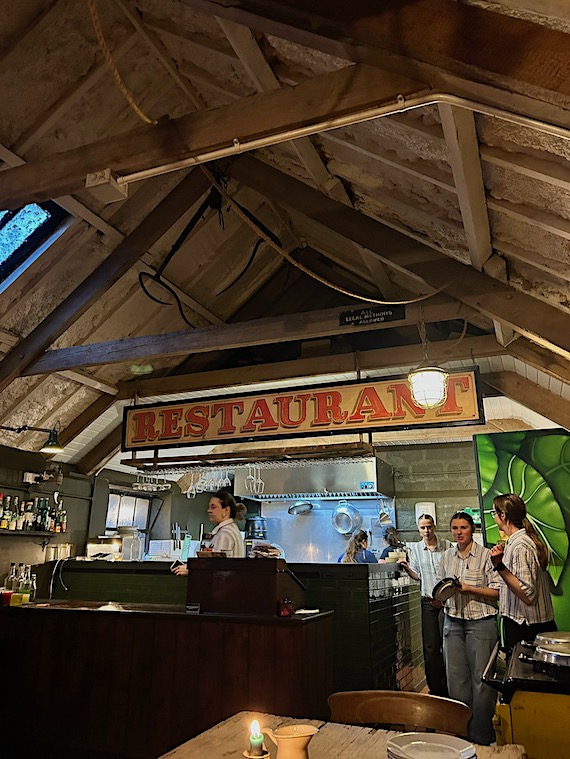
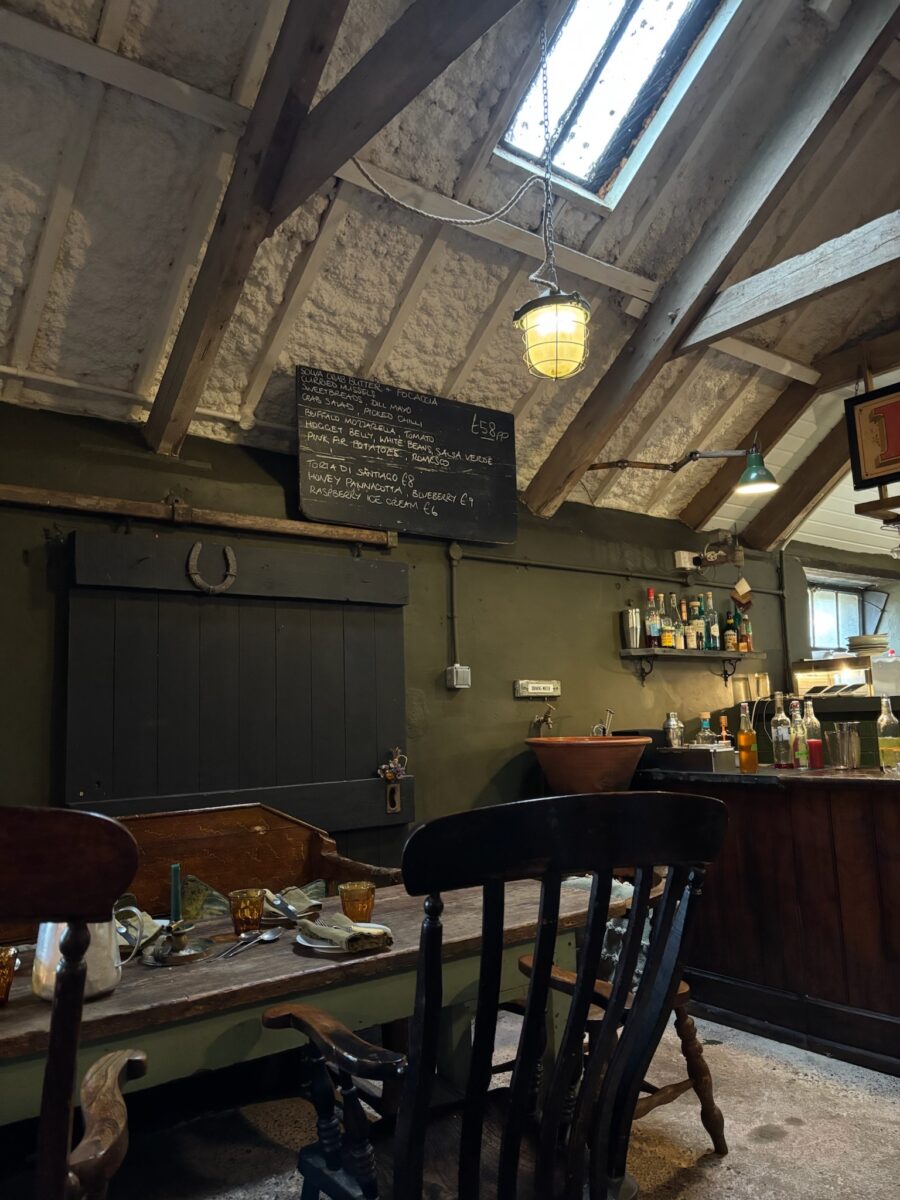
The food
As the first to arrive, we find Michelle Evans – creator, cook and owner – writing tonight’s menu on the blackboard. A divorce lawyer who traded in Cardiff to return home to Pembrokeshire, Michelle has created something that makes you want to upsticks and follow her lead. Paternoster reminds you why Wales, and this particular stretch, is so special.
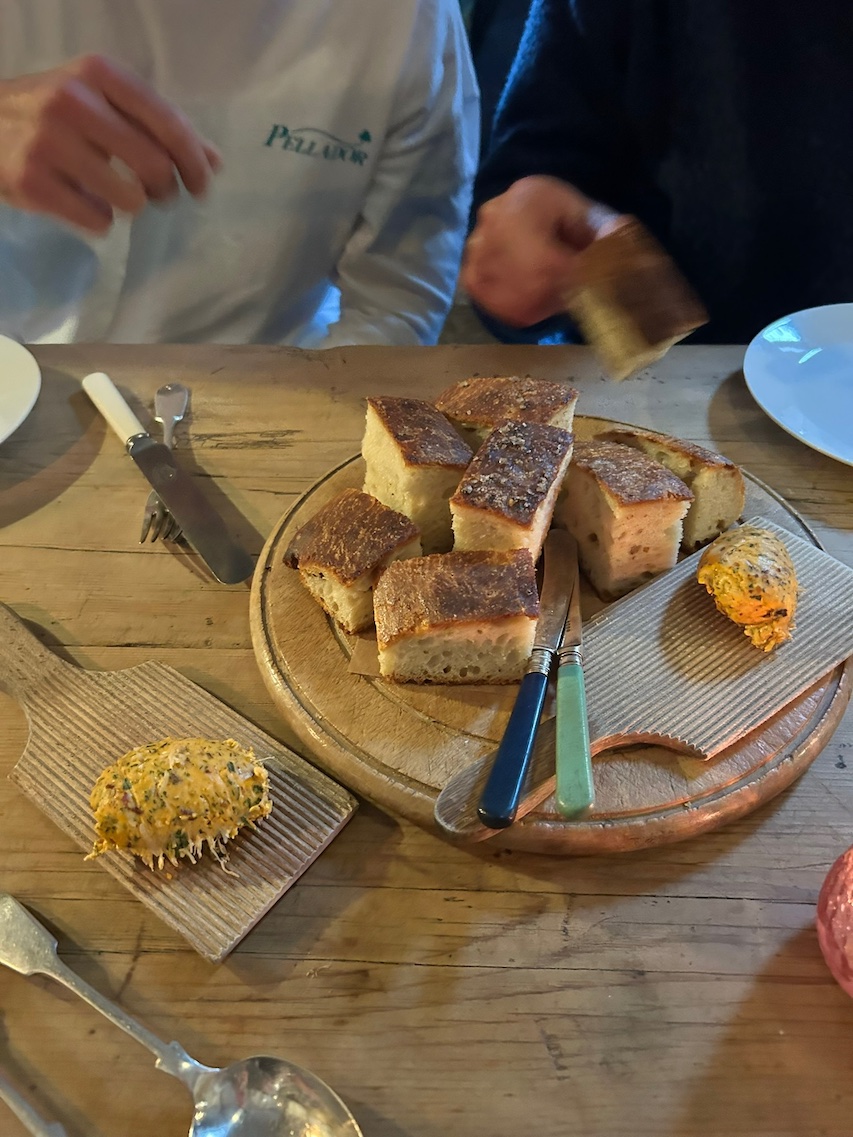
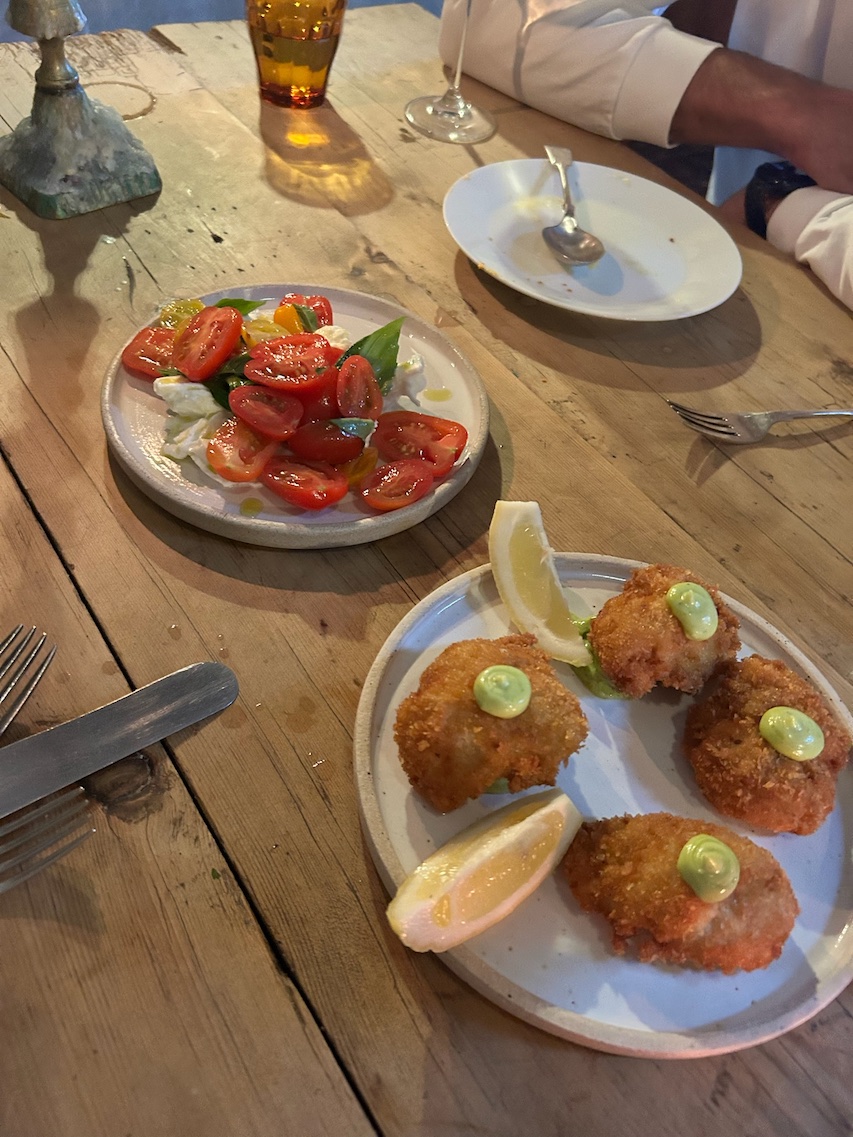
The menu changes daily, depending on what’s available and in season. Beyond that, it’s Michelle’s rule. All food is sourced from the farm or locally from Pembrokeshire, with some forgivable exceptions. It operates as a set menu. Tonight’s starts with focaccia and Solva crab butter, an early contender for best dish. Curried mussels follow, a sauce perfectly moppable with the focaccia – if you manage to keep some back.
Deep fried sweetbreads with dill mayo and a squeeze of lemon is reminiscent of fried chicken. There’s depth and richness, but even then it’s hard to beat the original. Crab salad with pickled chilli adds a freshness and zing to bring the starters to a close.
Mains roll in, starting with buffalo mozzarella, tomatoes, a few basil leaves and a drizzle of olive oil. We all know how it goes, a classic Caprese. But this dish is lifted by the quality of what’s on the plate. It is indicative of Michelle’s willingness to let flavours do their thing. Hogget belly, white beans and salsa verde are served with crushed pink fir potatoes on a bed of romesco sauce. It’s a dish that makes you wish you were dining solo.
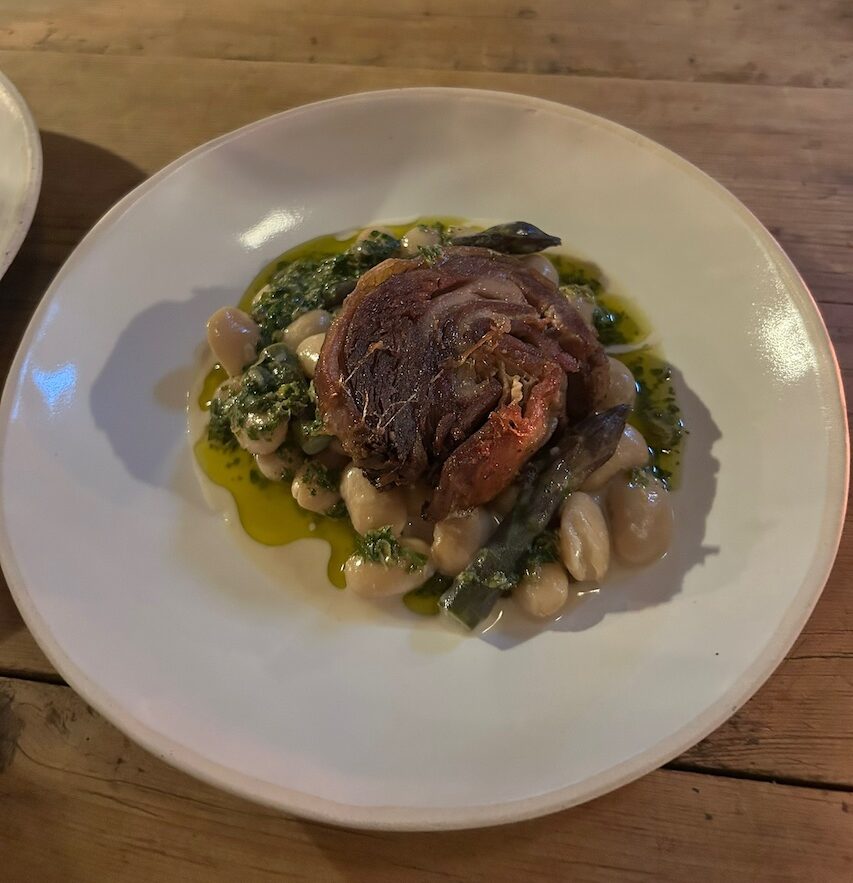
When starters and mains are this good, seemingly crafted in such a simple way, puddings can easily disappoint. But that’s not the case here. Two of the three desserts were up there with some of the best I’ve eaten. In particular, the Torta di Santiago – a cake you’d turn your nose up at as a child – is perfection within adult circles.
Alongside it arrives honey pannacotta with a blueberry compote. Smooth, creamy – and probably unnecessary – indulgence. Homemade raspberry ice cream is great, but comfortably third in a two-horse race. Either way, it brings an end to a meal full of colour, surprise and impeccable balance.
True ‘field to fork’
As a self-proclaimed ‘true field to fork’ restaurant, Paternoster Farm sets a high bar. The menu does not bow down to the latest craze; only to what is available either on the farm or sourceable locally. Some purists may argue that because of this it cannot be classed as a true ‘farm to table’ restaurant. But, even if those doubters were to exist, they would be wrong. Chez Panisse itself, where ‘farm to table’ supposedly began, doesn’t have its own land and must instead search locally.
At Paternoster, from the moment you pull into the farm it is impossible not to feel closer to what you’re about to eat. In the loos, you can hear lambs bleating behind a corrugated wall, like some kind of rural soundscape on repeat. It may not be for everyone, but that is exactly the point: you’re within touching distance of things soon to be on your plate.
There is so much to enjoy about this place – whether it’s the combination of flavours, the quality of produce or the restaurant’s decor. It’s intimate, slightly whacky, but unquestionably interesting. There are and will be other interpretations of Paternoster Farm in Wales and beyond. But for those restaurants to compete and attract – to persuade people to turn off and take the road less travelled – they must find the right balance between experience and flavour. Paternoster Farm certainly has.
All of the above makes it even sadder to hear that Paternoster Farm is set to close later this year due to a lease renewal from Pembrokeshire County Council. Despite receiving a four-star review from the Sunday Times, Pembrokeshire risks losing one of its (and Wales’s) best restaurants. There are plans to move to another site, but the future remains unclear. Our advice – get there while you can.
Jacob Butler is a writer from Abergavenny. He specialises in food writing, particularly Welsh food and its presence both in and outside Wales. He is a regular contributor for the Abergavenny Food Festival.

